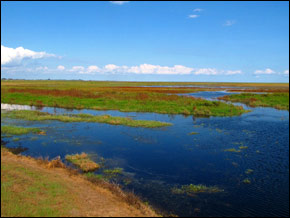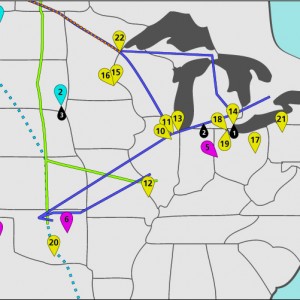Peter Gleick: Climate Change, Disbelief, and the Collision between Human and Geologic Time
Geologic time scales are long – too long for the human mind to really comprehend. Over millions, and tens of millions, and hundreds of millions of years, the Earth has changed from something unrecognizable to the planet we see on maps, plastic globes, and photos from space. The Atlantic Ocean didn’t exist eons ago and it will literally disappear in the future as the continental plates continue to move inch by inch. A visitor from outer space millions of years ago would have looked down upon land masses and land forms unrecognizable today. As John McPhee notes in his book, Assembling California, “For an extremely large percentage of the history of the world, there was no California.” Or North America, China, Australia, Hawai’i, Mt. Everest, Grand Canyon, or any of the other landforms and natural symbols we think of as immutable.
Humans cannot relate to these changes. Our perception of time is short — measured in days, months, years, or decades, not millennia or eons. And our perception of the world around us is similarly driven by events with human time scales. Again, John McPhee:
Nowhere is this collision of time scales more pronounced than in the current climate change debate. There are a variety of reasons why a few people still find the reality of human-caused climate change to be inconceivable. Leaving aside those who are unfamiliar with or ignorant of the science, those who simply shill for the fossil-fuel industry, and those who for political reasons must toe an ideological line that contradicts scientific conclusions, there remain some whose world view prevents them from accepting that humans can influence something so vast and global as the climate. Coupled with the fact that the Earth’s climate fluctuates naturally, this group has never been able to accept the reality of human-caused climate change. For regular readers of the blogs of climate contrarians (or their comments on this and other essays on climate change), this sentiment will be familiar. Here are a few examples:
Observed climate changes since 1850 are linked to cyclical, predictable, naturally occurring events in Earth’s solar system with little or no help from us.
Global Warming, Global Cooling and Global Climate Change have been happening for millions of years – long before any possible human influence – Climate Change is natural and nothing new.
This is a manifestation of the collision that McPhee describes, the conflict of human and geologic time scales.
Climate does change naturally for reasons well understood by scientists. But it does so over thousands or tens of thousands of years – time scales so slow as to be imperceptible to humans. The causes of these natural climate changes are the cumulative result of tiny but cosmic changes, including incremental shifts in the orbit of the planet around our star, the tiny but real wobble of the Earth’s axis, and variations in the output of energy from the Sun. These natural factors lead to changes in the Earth’s climate. They cause the ice ages, and they cause the warm interglacial periods. But they happen slowly – in geologic time unseen, unperceived, and unfelt by humans. The peak of the last ice age was 20,000 years ago, long before human civilization existed. The next ice age isn’t expected to start for thousands of years and may not peak for tens of thousands of years, and who knows what kind of civilization will exist then.
Human-caused climate changes are different. As the planet’s population has grown to 7 billion people, and as we have learned how to mobilize vast quantities of carbon-based fossil fuels (ironically, created over geologic time scales) to satisfy our short-term energy demands, we have become powerful enough to overwhelm slow geological cycles. We are, for the first time in the 4+ billion year history of the Earth capable of altering the largest geophysical system on the planet – the climate – and we are doing it on a human time scale of years and decades, with consequences we are only just beginning to comprehend. And ironically, our effect on the climate is still slow enough for policy makers, climate contrarians and skeptics, and those simply not paying attention to either actively deny it or to just look the other way, committing the planet to more and more change. [There are other examples of human influences on a global scale: our construction of dams and storage of massive quantities of water behind reservoirs has literally, albeit modestly, altered the rotation of the planet. But none are as significant as our effect on the climate.]
Some will never be able to accept this, no matter the evidence. They will continue to conflate geologic and human time scales and assume that what is occurring today must be what has always occurred in the past — natural. But the inability to comprehend the planetary influence of humans isn’t based on reviewing and rejecting the scientific evidence, which is clear to 97-98% of climate scientists publishing in the field. It is based on ignoring or disbelieving it, just as some dogmatically refused to abandon their belief in a geocentric universe for reasons that had nothing to do with science. And alas, these modern-day dogmatists are unlikely to change their minds, at least not on a human time scale.
Peter Gleick
Originally published by Forbes on January 19, 2012.








There’s nothing like generalizing opinions and then saying that’s what people think to obscure what they actually do think. An online science writer that I exchange notes with infrequently also blogs – and I’m quite certain inthe articles he has written one complaint was that the current presentation of ‘climate science’ ignores not only the potential but reality of sudden shifts in conditions.
http://www.aip.org/history/climate/rapid.htm for instance only notes rapid shift. The idea humans are responsible, however, is predicated on both the association of CO2 with warming rather than the inverse and measurements which will cause future change.
Convince me that the complete lack of available proof that is the basis of Scientific Method allows one to ignore an utter and complete ability to verify such conclusions or to refine calculations : not that modeling – even if correct in assumptions, scope and input – gives one the ability to forecast, as Roger Pielke Sr. notes.
I’ve been having good fun noting the vehemence of Lubos Motyl at his ‘Reference Frame’ against mock science, though JoAnn Nova likely is easier to understand. But every time someone like Judith Curry wakes up to the lack of proof underpinning the IPCC’s representations the shrieking about ‘corporate spin’ increases.
No. Modeling is an interesting exercise but yields no reliable data. How could it when based on oversimplification of a system where drivers are not static,identified,measurable,measured,understood……
Identification of Talking Points used by Deniers in fact shows politicization of the issue : a football where points are made rather than an issue driven by inquiry.